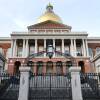It's been 60 years this year since the first televised presidential debates, and they have had a major impact on how we choose our politicians ever since. GBH Morning Edition host Joe Mathieu spoke with Fredrick Logevall, professor of history at Harvard University and author of the new book "JFK: Coming of Age in the American Century, 1917-1956," about those first debates and how they changed politics forever. The transcript below has been edited for clarity.
Joe Mathieu: Some say John Kennedy won that debate, at least on television. But famously, people who listened on the radio had a different impression. Fast forward 60 years and these televised debates are carefully choreographed affairs, Fred, that can make or break a president.
Fredrik Logevall: No question about it. I think both candidates, even in 1960, understood that this could be something really big. They didn't realize how big, but I think even then, Kennedy and Nixon thought this could be a game changer. But it was not, as you say, the kind of choreographed, carefully planned thing that it is now, where the campaigns know months in advance that they're going to have these debates and prepare accordingly.
Mathieu: Is it true that the debate played differently on TV than it did on the radio, affecting one candidate's outcome or the other?
Logevall: I think maybe to a degree it played differently. I'm a little skeptical myself of the suggestion that among radio listeners, Nixon was perceived to be the winner, or at least we don't have a lot of evidence for that claim. But I do think that on television, Kennedy's youthfulness, this demeanor that he had on the set, and the fact that he was crisp and clear in his responses, I think it made a difference among voters — many of whom, by the way, didn't really know that much about him. I think it helped helped Kennedy a bit more than they helped Nixon.
Mathieu: One of the three scheduled debates in this cycle was canceled, as we all know, after President Donald Trump refused to take part in a virtual format following his COVID diagnosis. And at the time, he said, Who would want a debate on a computer looking at a TV screen, or whatever it might be? In fact, this happened before, in the same Nixon-Kennedy race.
Fred, that was all before Zoom. How did the format work then?
Logevall: Well, they were 3,000 miles apart. It's kind of astonishing when you think back on it now that they had the kind of technology available for them that could do this. And it was necessitated really by the fact that their campaign schedules were such that they really didn't want to take the break to fly and be in the same place, which also tells you something about the degree to which they were less scheduled in those days, and maybe campaigns attached less importance to these debates.
But it's striking to me that, in fact, the technology worked pretty well. This third debate, which I think the consensus was that Nixon won. He was a little more comfortable, apparently, when he was not in the same room as his candidate. And I think it came off pretty well here. He in particular was strong [and] Kennedy, I think, did just fine. But, yeah, they were a continent apart for that third debate.
Mathieu: As we try to figure out where we're going here a little bit, Fred, or even where we are now in the age of social media, we see highlights, clips being tweeted, retweeted, [and] posted on Facebook. Hot takes by anyone with an account, instant analysis on websites, cable news, all on the loop tape. Each of these offering a slightly different angle or altogether different meaning to what actually happened on the debate stage.
Logevall: Yeah, it's remarkable the degree to which this has become such a centerpiece in all presidential campaigns. Even in the spring in the primaries, people are already beginning to think, "If we nominate him or her, how will they fare in these debates that are to come in the fall?" That's how how large they loom. And of course, we had none of that in 1960. Even if, as I suggested earlier, some inkling I think people had, which I think is fascinating that this is a game changer. That is to say, in the first debate in September of 1960, I think people said we could have a huge audience for this. And they did. 70 to 75 million people tuned in in 1960 for that first debate, which I think is a comparable number to what we're getting in a much larger country today.
Mathieu: Yeah, that's a remarkable audience in 1960. I guess I'd ask you then in the end, Fred, are they becoming a disservice to the process?
Logevall: I don't think so. You know, I guess like everybody else, sometimes when I watch our more recent debates, I do think to myself, "Is this helping us in helping our democracy? Is this really contributing to the kind of conversation we need to have?"
But having two candidates for this office — the most important office in the land — having the two of them go at each other debating the issues I think [is] something we've got to continue to do. I think it should stay the practice, imperfect though it sometimes is.





